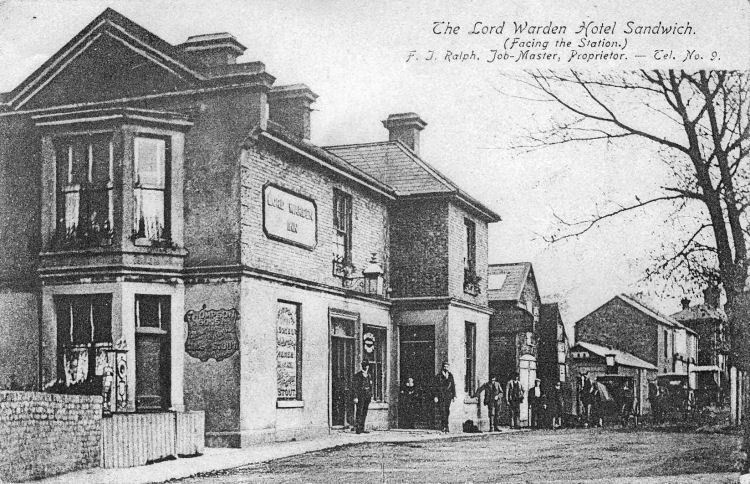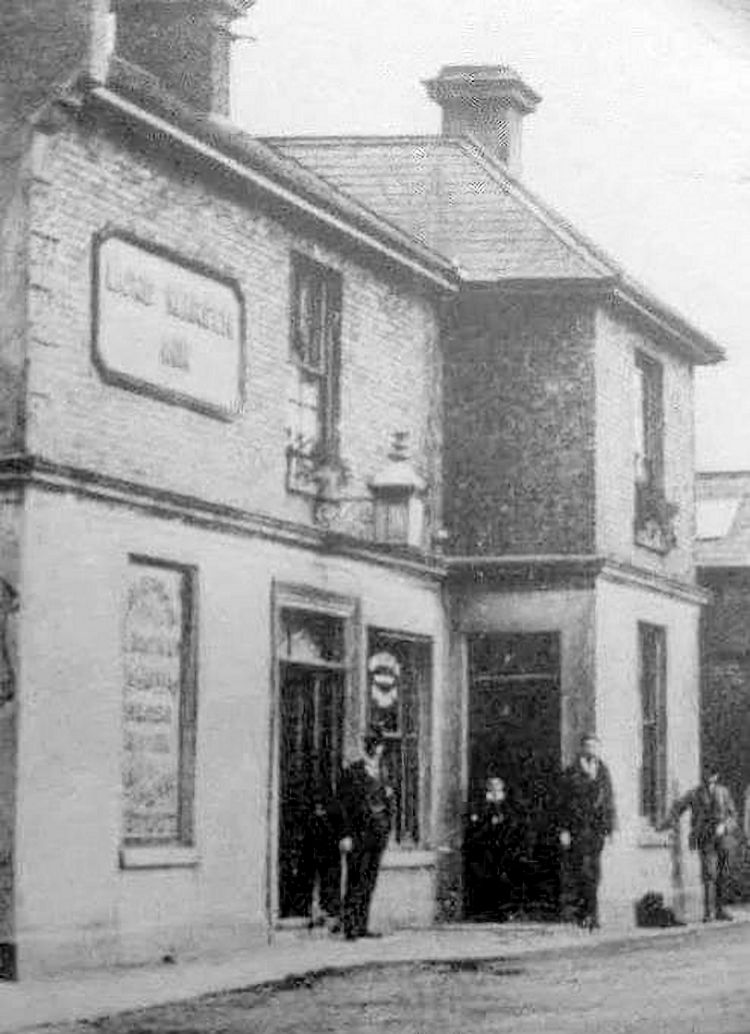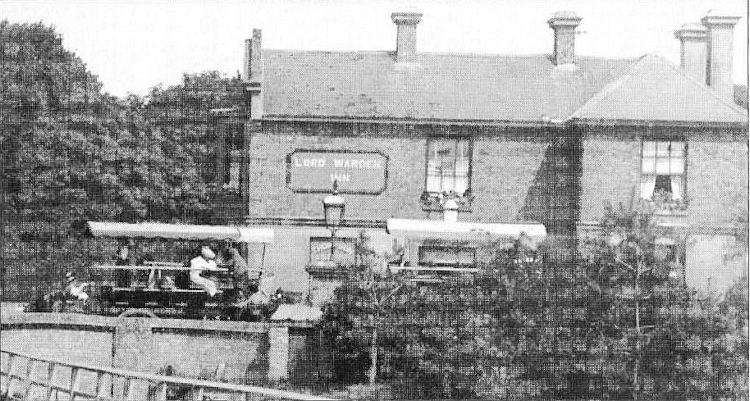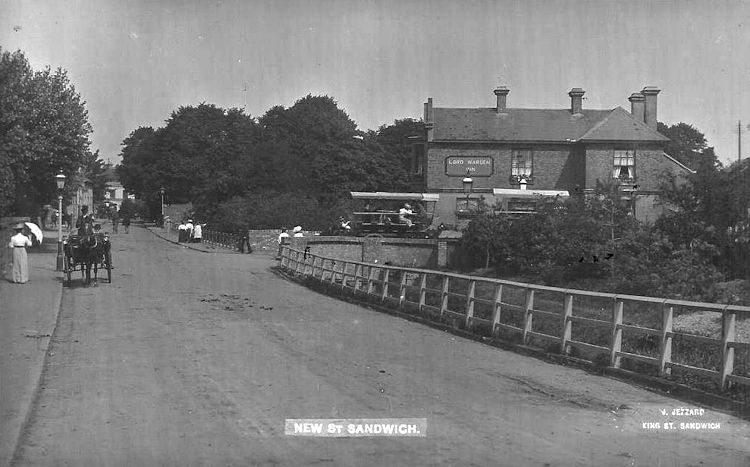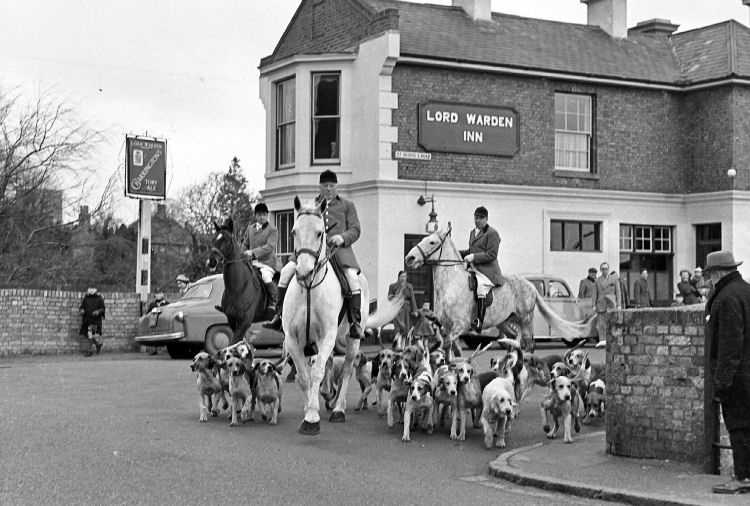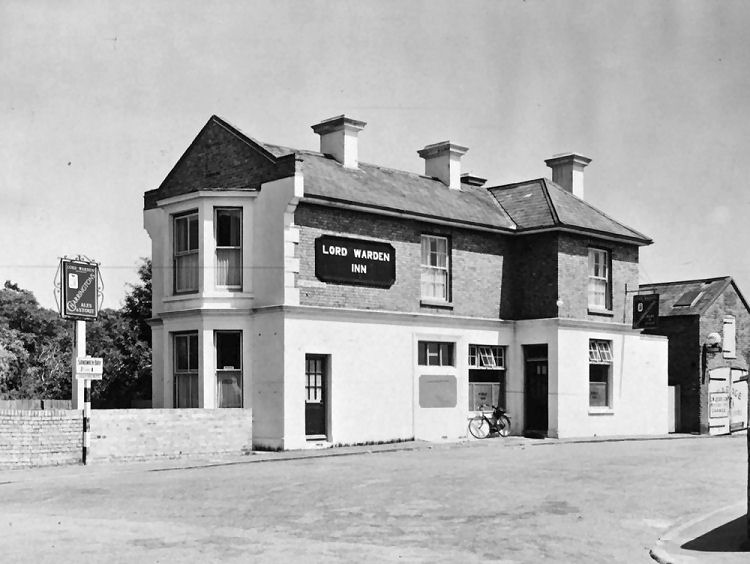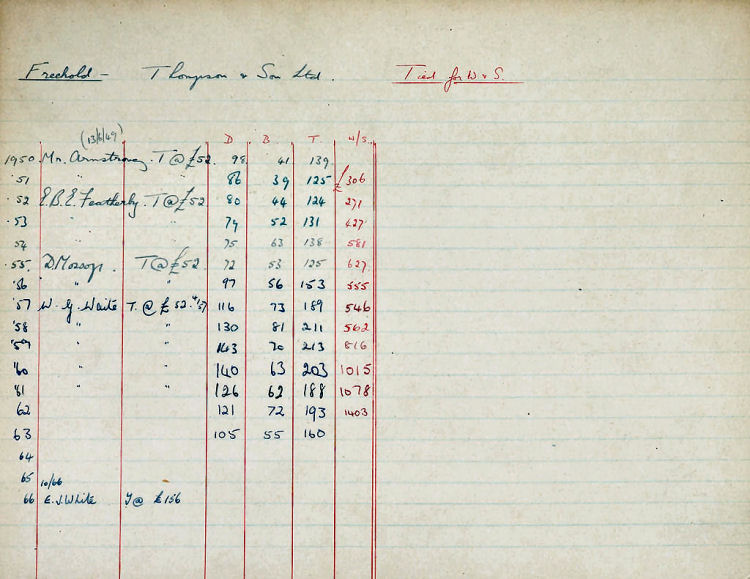|
From the Deal, Walmer, and Sandwich Mercury,
30 January 1869. 1d.
SELLING DRINK DURING PROHIBITED HOURS
George Harding, of the "Lord Warden," was summonsed for with keeping
his house open during Divine Service.
Mr. Mourilyan appeared for the defendant.
Richard Jordan said that on Sunday, the 17th inst., by direction of
Buss, the constable, he went to defendant's house about eleven a.m., and
was served with a pint of beer in the kitchen by Mr. Harding. Two other
men were there - one named Terry. They were both served beer by Mr.
Harding, and both paid for it.
Cross-examined: Buss went for him and asked him to do this, as he
wanted to catch defendant. Had not yet been paid anything for the
spying. Should like to be paid of course, and expected to be paid for
his day's work.
Chief Constable Buss said that on the 17th inst. He saw the last
witness and two other men, one of whom was a resident in Sandwich named
Terry, go from the road towards the back of defendant's house. This was
about seven o'clock in the afternoon. Could not see whether they entered
the house or not.
Mr. Mourilyan then addressed the Bench for the defence, and admitted
that if they believed the evidence of the witness Jordan there certainly
was evidence against his client. But he entreated them to receive that
evidence with the greatest caution, as in all courts of law the evidence
of an informer was received with suspicion, and was required to be
corroborated. Now in this case they had only the evidence of the
informer, and he maintained that such evidence was not sufficiently
corroborated to justify the Bench acting on it. Of course neither his
client, Mr. Harding, nor his wife could give evidence in the case, but
he was instructed to say that they both indignantly and most positively
denied the charge. The learned gentleman, after some further remarks
said: "Before I sit down I must say I see with regret this French spy
system introduced into England, and more particularly in the old town of
Sandwich. I will not waste words on the witness Jordan, but will only
say that the man who will sell his fellow-man for filthy lucre will be
treated with caution and disdain by all responsible persons." As for the
conduct of Chief Constable Buss, he was sorry that he had stooped to
such means as these. Surely if he were more active and took a little
more pains he had no need to employ such men as the witness Jordan to do
his dirty work. If......
Here the Mayor interrupted Mr. Mourilyan, and said whatever the
constable had done was with the sanction and approval of the
Magistrates.
Mr. Mourilyan said he was indeed sorry and astonished to hear it.
Surely it was bad enough for a constable to use such means to obtain a
conviction, but that any bench of Magistrates could stoop to such a
thing amazed him beyond measure. Where was the safety of the subject if
the Bench were first to employ spies and then act on their evidence? In
this case he felt it would be useless for him to occupy their time any
longer, for it was not likely that they would discredit the evidence of
their own paid witness, and that nothing he could say would be of any
avail. He would therefore sit down. The learned gentleman resumed his
seat amid the applause of a crowded court.
The court was cleared, and on the readmission of the public, the
Mayor said that they fined the defendant 10s. and 12s. costs, and told
him complaints had been made about his house. He also warned him that if
he again offended the fine would be increased. With reference to Mr.
Mourilyan's remarks, his Worship said that such people as the witness
Jordan were often employed in London.
|
|
From the Deal, Walmer, and Sandwich Mercury,
12 May, 1900.
THE MOP STEALING CASE
Douglass Drayson was then arraigned and charged with stealing a mop
and handle, value 1s. 3d., the property of Frederick J. A. Ralph, at
Sandwich on the 15th March, to which he pleaded not guilty.
The Grand Jury found a True Bill in each case, and the Petty Jury
empanelled to try them comprised - Messrs. W. Howard (foreman), Henry
Chapman, E. Castle, T. J. Collard, H. Hook, G. Lewin, G. Cullen, W.
Burton, E. Brisley, William Austen, M. DeCosta, and W. H. Sidders.
Mr. Hubbard, Town Clerk of Ramsgate, said he had just been introduced
to undertake to conduct the prosecution in the prisoner Drayson's case.
The facts were very simple and short, and he would leave it to the
witnesses to state them, except to say that when apprehended by the
constable and charged with stealing the mop, prisoner said he had been
in the habit of using it for something like a month, but afterwards made
a statement that he had only just picked it up, and in consequence of
being afflicted with rheumatic gout, had used it just for the moment.
P.C. Phillips deposed that he was on the quay at Sandwich on the 15th
March at one o'clock in the morning, and saw prisoner coming down Ship
Alley with the mop (produced) in his hand. Witness asked him what he was
going to do with it, and he said he was obliged to come up and get it,
because he was lame and could not walk. Witness struck several matches
and examined the mop, and asked prisoner how long he had had it. He
replied that he had had it for a month, and used it every day. Witness
made enquiries and found that the mop belonged to Mr. Ralph, and
therefore arrested prisoner. When charged, prisoner said "Well we shall
soon get over that."
By Prisoner: He was leaning on a stick in the other hand, and not on
the mop.
Frederick J. Ralph, of the "Lord Warden," Sandwich, said the mop
belonged to him, and was used the previous day.
Thomas Edward Clark, in Mr. Ralph's employ, said the mop was left
outside the stable door the night before.
By the Recorder: Anyone passing down the road would see the mop.
Prisoner: Supposing the mop fell down, I suppose any one could pick
it up without trespassing.
Witness: The mop was standing by the rain water butt.
Prisoner, addressing the Jury, said he was very lame, and was looking
for something to support himself with, as he was so troubled with
rheumatic gout and could not stand. he went down this bye-lane to try
and find a stick or something to support himself with, when he found the
mop in the roadway. He picked it up, and as it looked like an old one
that had been thrown to one side, he made a sort of crutch of it and
helped himself along with it.
A Juror: How came you, at that time of night, to be looking for some
support?
The Recorder: You must not ask the prisoner questions. He is simply
making a statement.
Mr. Hubbard said the prisoner seemed to have made two various
statements. In the first place he told the constable he had had the mop
in his possession a month, the same as he told the Magistrates, and now
he told the Jury that he had just picked it up. Here they found the man
in possession of another man's property, and he had to give a reason why
that property, belonging to another, was in his possession. Otherwise,
it was inferred that he had converted it to his own use - in fact, that
he had stolen it. The prisoner in this case had made two statements, and
it was for the Jury to decide whether they believed his statement, or
whether they were to infer that he was untruthful in what he stated. As
he had told an untruth, the fact that he had stolen the mop might be
fairly inferred.
The Recorder said it was a very simple case, and the evidence was
very short. The prisoner said he thought the mop was useless and one
that had been thrown away, and that he used it to get along with. If it
were true that he thought it belonged to nobody and had been thrown
away, he would have a perfect right to take charge of it until he found
it belonged to somebody else, and he would be acting within his rights
in using it. But his story did not seem to be a very true one. he could
not think a man would be walking about at a quarter to one, practically
in the middle of the night, looking for someone to help him along. It
was a time when most people were in bed, and it seemed the more
remarkable that a man who had rheumatism, as prisoner said he had,
should be walking about in the middle of the night. And when the police
came he did not tell the truth, and say, as one would expect him to do,
that he had picked it up and thought it did not belong to anyone, but he
goes into the story that he was lame and had to go home and fetch the
mop, and that he had had it a month. If they thought a man who would
tell such a story to the policeman, would tell the truth in other
matters, they were at liberty to believe him, but he should have thought
that if one part of the story were true he would have told the truth to
the other, which he did not seem to have done, and the Jury must take
that into consideration, when they considered whether his story as to
his thinking the mop was useless and did not belong to anyone was a true
one or not. It was for the Jury to say whether they thought his story
was correct, or that he was walking about, probably looking for
what he could get, and that although he knew perfectly well the mop
belonged to someone else, he thought it a good opportunity to take it,
in the middle of the night, and did so.
The Jury found the prisoner guilty, and he admitted having been
convicted of felony at the Deal Quarter Sessions in 1898.
In reply to the Recorder, Sup. Chaney said the prisoner was a native
of Sandwich, and had, in fact, been a tradesman there. he had, however,
of late frequented public houses, given way to drink, and committed
petty thefts.
The Recorder said it was of course a very small felony, and if
prisoner had not been charged before he should have dealt very leniently
with him, and probably given him a days' imprisonment. But unfortunately
he had been before the Court before, and from what the police said he
seemed to have taken to drink and to be fast going down hill. Prisoner
had, however, already been in gaol two months, waiting to be tried, and
he thought that should be taken into consideration. Probably if he went
to prison for another month he would have time to think over his foolish
conduct; at all events he would be kept from drink. The sentence of the
Court was that he be kept to hard labour for one month.
|
